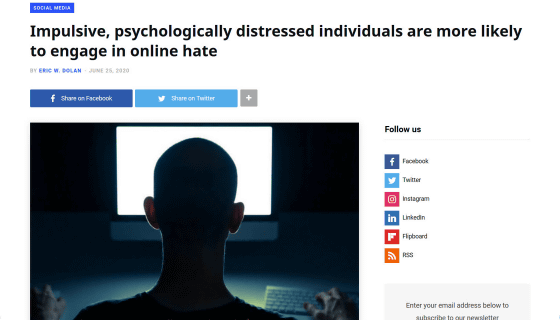What kind of person is it easy to attack others on the net?

The vandalism that attacks the specific person, content, thought, etc. on the Internet by violent abusive language sometimes causes escalation to the extent that the victim suffers suicide. A Finnish research team has published a study of what types of people are more likely to attack others on the Internet.
Impulsivity, internalizing symptoms, and online group behavior as determinants of online hate
Impulsive, psychologically distressed individuals are more likely to engage in online hate
https://www.psypost.org/2020/06/impulsive-psychologically-distressed-individuals-are-more-likely-to-engage-in-online-hate-57137

``Online hatred and attacks are currently one of the most important social issues, as well as personal and community well-being and security,'' said Markus Kaakinen, a postdoctoral fellow at the Institute of Criminology and Law and Policy at the
Therefore, the research team of Kaakinen et al. conducted a study to investigate the characteristics of people with strong aggression online. First, the research team conducted a survey of 1200 young people aged 15 to 25 years old in Finland, and investigated online aggression, personality and mental status of individuals, and usage of social media.
As a result of the survey, people with elements such as 'impulsive personality' and 'mental state such as anxiety and depression' can easily send messages that anger or threaten other users on social media It turned out. Also, it seems that people using Twitter and Instagram are more likely to contribute to online hate, while people using YouTube and instant message apps tend to be less related to online hate.
Kaakinen points out that personal and social factors are associated with malicious online behavior. “For example, a person who has psychological distress and prefers to interact with like-minded groups is more likely to threaten or slander others on social media. Like social violence, online hate is more likely to be done by someone with an impulsive personality,' Kaakinen said.

In a follow-up study, the research team also conducted a questionnaire survey of 160 young subjects and a
An analysis of the answers of the questionnaire survey and the vignette survey conducted in advance revealed that the subjects with a strong tendency of ' self-stereotyping ' to apply the stereotype common to the group to which they belonged were engaged in online hate in the past. It turned out that the ratio of doing it was high. We also found that subjects with a strong tendency for self-stereotyping were more likely to respond to the “answers given by members of the assigned group” in their gambling message responses.
Kaakinen pointed out that those who are vulnerable to attacking others on social media are more likely to depend on the stereotypes in the group. He also noted that those who prefer active communication in online groups tend to leave their decisions to the group members and stereotypes.

This research is just an investigation of correlations, and it is said that evidence based on further experiments is necessary to prove the causal relationship. In addition, Kaakinen believes that there is also a need to investigate how individual identity and depersonalization of societies in online interactions may differ.
'Many of the challenges of modern social media, such as online hate, social polarization, echo chambers , and the spread of fake news can be understood through the lens of personal and social identity,' Kaakinen said. He argued that there is a need to conduct psychological and social research on the construction of identity, etc.
Related Posts:
in Science, Posted by log1h_ik







